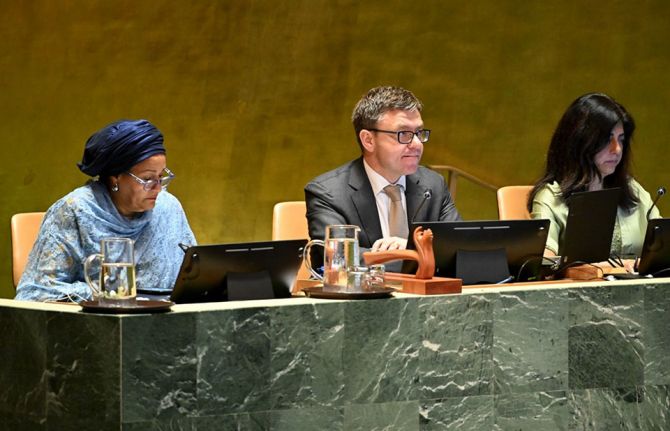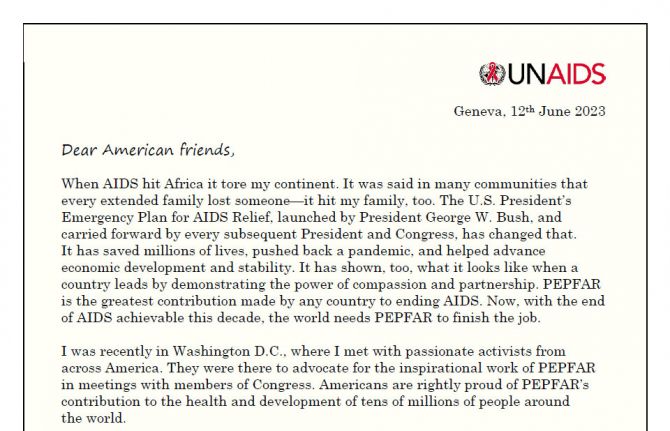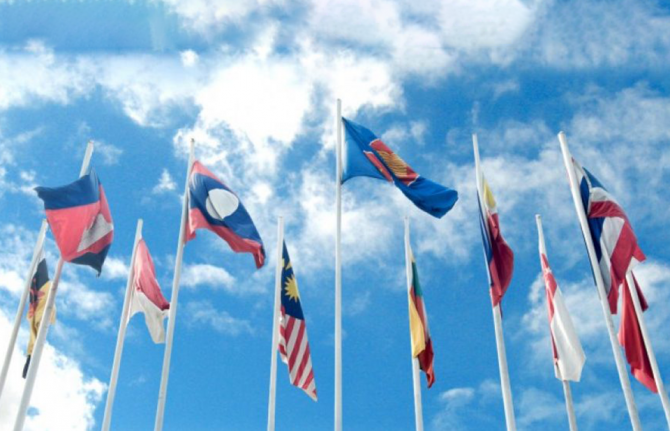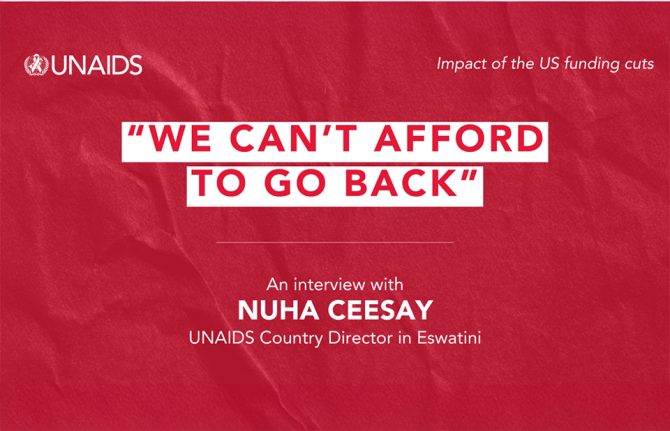
Feature Story
CONCASIDA opens with spotlight on needs of young people
01 March 2010
01 March 2010 01 March 2010
The Sixth Central American Congress on HIV/AIDS and Sexually Transmitted Infections (CONCASIDA) will take place in San Jose, Costa Rica from 1-5 March 2010 with the theme "Youth: for my right to know and decide."
CONCASIDA, a multi-sector event which aims at sharing experiences, scientific information and research, takes place every two years in a Central American country. This year, the congress aims to focus its attention on youth vulnerability of Central American countries due to the lack of sexual education and the increase in infections within this age group. CONCASIDA also aims to analyze the social impact of this on Central American nations.
A 2008 study carried out by the United Nations Population Fund and UNICEF with support from UNAIDS showed that the majority of young people in Costa Rica were sexually active at the age of 16. The study also highlighted that there was lack of HIV information and knowledge among Costa Rican youth.
The study shows that in Limón only about 28% of the young people interviewed know how to use a condom correctly whereas in Puntarenas the percentage drops to about 17%. Furthermore, in both provinces, more than 50% of the adolescents find that asking a partner to use a condom could be interpreted as a sign of mistrust. Finally, 43% in both provinces think that a young girl carrying condoms in her purse is a woman with a “doubtful reputation.”
This year’s main themes of the congress include care, control and surveillance; prevention and promotion; risk factors for social and psycho-emotional; human rights and legislation; and monitoring and evaluation of HIV and AIDS commitments.
During the congress, different stakeholders will present the result of their work and search alternatives for more effective ways to respond to the AIDS epidemic.
CONCASIDA opens with spotlight on needs of young
Key populations:
Cosponsors:
Feature stories:
Costa Rica: Peer HIV prevention programmes to be promoted for young people (03 Mar 2009)
5th Central American Congress on AIDS - CONCASIDA, 4 - 9 November 2007 (04 Nov 2007)
External links:

Feature Story
During Winter Olympics, UNAIDS calls on Canada to ensure G8 delivers on universal access
28 February 2010
28 February 2010 28 February 2010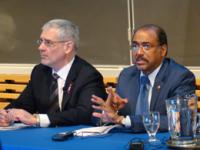
(from left) Dr Julio Montaner, Director of the British Columbia Centre for Excellence in HIV/AIDS and President of the International AIDS Society; Michel Sidibé, UNAIDS Executive Director. Vancouver, 26 February 2010.
Credit: UNAIDS
A global summit on HIV was hosted by LifeSciences British Columbia, the BC Centre of Excellence in HIV/AIDS, and the University of British Columbia (UBC) on 26 February against the backdrop of the 2010 Olympic Games. Endorsed by the International AIDS Society, the event "The Impact of Science & Innovation in the Evolving Global Health Paradigm: HIV and AIDS - A Challenge of Olympic Proportion" brought together world leaders in HIV research, health, innovation and policy to share latest and compelling perspectives on the challenges being faced under a shifting global health paradigm.
During the international summit, UNAIDS Executive Michel Sidibé called on the Prime Minister of Canada to ensure that the G8 delivers on its commitment to universal access to HIV prevention, treatment, care and support. “As the host [of this year’s G8 Summit], Prime Minister Stephen Harper can set a bold agenda for the summit.”
As the host of this year’s G8 Summit, Prime Minister Stephen Harper can set a bold agenda. The G8 has a moral obligation to ensure their commitment to universal access is fulfilled
UNAIDS Executive Director Michel Sidibé
“The G8 commitment to universal access must be fulfilled. For tens of millions of people, please do not allow their hope for universal access to be transformed into a universal nightmare.”
Dr Stefano Bertozzi, the recently appointed HIV Director of the Bill and Melinda Gates Foundation, described the impact of the global financial crisis on funding for AIDS. “The slowdown of global funding for HIV risks backsliding in the continued scale-up of HIV treatment.”
Bertozzi described the financial crisis as an important opportunity to improve the efficiency of HIV programmes, which can also be used to improve the performance of health systems. He called on using treatment more creatively and effectively to serve the goals of both prevention and treatment. “Comprehensive combination prevention presents the ideal marriage of treatment and prevention.”
During these impressive Olympics in Vancouver, we are working towards our common goal of a world without HIV”
Tommy Sithole, Director of International Cooperation, International Olympics Committee
This meeting was organized by Dr Julio Montaner, Director of the British Columbia Centre for Excellence in HIV/AIDS and President of the International AIDS Society. Dr Montaner described British Columbia’s ambitious $48 million pilot programme to send health-care workers onto the streets of Vancouver to diagnose and treat hard-to-reach populations such as people who inject drugs, using early treatment as an aggressive form of prevention. The programme, called “Seek and Treat”, will improve access to treatment to the populations that are still disproportionately affected by HIV in Vancouver.
The meeting also featured a message from the International Olympic Committee (IOC) about its innovative HIV campaign during the 2010 Vancouver Winter Olympics. Tommy Sithole, Director of International Cooperation for the IOC, cited the IOC’s partnership with UNAIDS as an example of how the Olympics can be used to highlight information about HIV. “The IOC can reach out on your behalf to the billions of people around the world that follow the Olympics. During these impressive Olympics in Vancouver, we are working towards our common goal of a world without HIV.”
During Winter Olympics, UNAIDS calls on Canada to
Press centre:
World Leaders in HIV/AIDS to convene in Vancouver during 2010 Olympic Games (23 February 2010)
Speeches:
Read UNAIDS Executive Director speech to international summit on the impact of science on HIV (26 February 2010)
Related

Feature Story
New wave of cooperatives in Cameroon help HIV-positive women gain economic independence
25 February 2010
25 February 2010 25 February 2010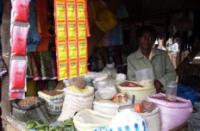
Honorine B has opened her own successful business as a result of the ILO/SIDA cooperative project.
Credit: ILO
Many people living with HIV face not only health issues but may also struggle to make ends meet economically. A number of HIV-positive women in north west Cameroon are taking the initiative by generating income through cooperatives, with the assistance of the International Labour Organization (ILO) funded by the Swedish International Development Cooperation Agency (Sida).
Cooperatives (coops) have historically provided much needed support for the disadvantaged, but people living with HIV have been marginalised or ignored, with coops sometimes refusing to disburse grants in the belief that investing in them would not see worthwhile returns. This project, set up last year, aims to change that.
The project aims that women gain more financial independence and generally enhance the quality of their lives. So far it has helped more than 100 women to operate in a broad range of areas including commerce, tailoring, designing, rearing pigs and poultry, secretarial support and communication services.
This is a large and notable project. A great deal of progress has been made and it has certainly had an impact at local level and reflects and responds to issues on the ground.
Dr Mamadou L Sakho, UNAIDS Country Coordinator for Cameroon
A revolving micro-credit fund scheme was set up in three micro-finance institutions across the North-west Region in Bamenda, Kumbo and Wum.
A number of safeguards were put in place by the ILO and its partners to try to ensure the project’s success. Support structures, called ‘Centres of Competence’ were provided by the CoopAfrica organization. These centres offered skills and resources for cooperative members to prosper and grow, pool resources and become increasingly empowered.
As well as funding grants for the micro-projects, assistance included training managers and psycho social and economic counsellors from the targeted micro-finance institutions to support beneficiaries. The training package contained business development, management procedures, AIDS support, counselling and stigma reduction components.
Capacity-building workshops were also held for HIV-positive women from the targeted communities on various aspects of running a business. Following the assessment of 192 micro-projects submitted after the training, 68 received seed funding and all of the beneficiaries are now running their own businesses.
Cheaka Toure from the ILO sub-regional office for central Africa believes that through this project both people living with HIV and their communities benefit. He notes that not only do resources go directly to those who are HIV-positive but they become key participants in the local AIDS response. “The project addresses HIV issues in a comprehensive and integrated way, combining behaviour change and care with economic empowerment of people living with HIV who are now main actors in their own destiny and can take care of themselves economically.”
Evodia A, one of the beneficiaries, has seen her life turned around. “I rear pigs. Before the project I had a single pig and with the funds that I got, I now have six. I have even set up a garden which is being fertilised with material from the piggery and now I harvest vegetables from the garden for my nutrition.”
A key knock-on effect of the relative success of the project is a greater self-confidence and hope among the women. Many others living with HIV have also expressed their willingness to become involved in the scheme.
Dameni Oussematou from Integrated Development Foundation, an ILO partner, has noticed this newfound self-confidence. “I am impressed by the rapid change the coop members are demonstrating. They are now business oriented…. and proud to show it. The saving habit is gaining ground; the repayment rate is 98% in two of the three cooperatives”. He adds, “And men living with HIV have expressed a strong willingness to be targeted by this intervention too”.
Dr Mamadou L Sakho, the UNAIDS Country Coordinator for Cameroon, shares this enthusiasm for the cooperatives. “This is a large and notable project. A great deal of progress has been made and it has certainly had an impact at local level and reflects and responds to issues on the ground. It would be welcome to see knowledge about the intervention reach a wider audience now.”
There have been numerous lessons learned. For instance, the capacity of the beneficiaries needs to be further built, given their heavy reliance on frequent visits from cooperative institutions to monitor their businesses and provide guidance. Identifying a greater number of activities with high income potential for the future is also suggested.
It is clear that the HIV-positive women taking part in the project have increased business acumen and insight which bodes well for their greater economic independence. A number have said that they now keep financial records for the first time and are better able to track the growth of their businesses. According to Honorine B, she has never looked back: “Before the project I bought my selling items in small quantities. I have increased my stock because of the project. I have opened a business place and have added plantains and cocoyam… I heartily thank the project.”
New wave of cooperatives in Cameroon help HIV-pos

Feature Story
Handbook on HIV for Parliamentarians developed in Cambodia
24 February 2010
24 February 2010 24 February 2010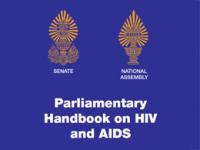
In Cambodia HIV prevalence has fallen to an estimated 0.7% among the adult population in 2009, down from a high of 2% in 1998. With this it is one of the few countries in the world which has achieved Millennium Development Goal 6 – to halt and begin to reverse the spread of HIV by 2015. At the same time, intensive work is underway to ensure Cambodia reaches its ambitious, yet attainable, universal access targets for HIV prevention, treatment, care and support by end of 2010.
Political commitment at the highest level is recognized as a critical factor in Cambodia’s success in creating a supportive legislative and policy environment, and building a strong multisectoral national response to HIV.
Cambodia is one of the first countries in the region to establish a Law on Prevention and Control of HIV/AIDS to eliminate stigma and discrimination and protect the rights of people living with HIV and those with risk behaviours for HIV.
It is against this backdrop that the Commission No. 8 with support from the National AIDS Authority, the UNDP Legislature Assistance Project of the National Assembly, Family Health International USAID funded Prasit Project, and UNAIDS, developed the Parliamentary Handbook on HIV. It was launched at the National Assembly on January 29, 2010.
“The Parliamentary Handbook on HIV provides an opportunity to renew the commitment to scale up services for universal access. As leaders accountable to the people of Cambodia, Parliamentarians’ understanding of the HIV epidemic and response is vital”, said Tony Lisle UNAIDS Country Coordinator for Cambodia.
In a mature HIV response, such as Cambodia’s, policies and legislation must be proactive, rather than reactive. Community involvement is key to address both the individual and societal factors that make people vulnerable to HIV infection, including men who have sex with sex workers, the wives of these men, sex and entertainment workers themselves, young people, men who have sex with men, and people who use drugs.
Also, through public forums and partnerships with civil society, parliamentarians can better monitor the effectiveness of the Law on Prevention and Control of HIV. Parliamentarians have a crucial role to examine how acts such as the Law on Suppression of Human Trafficking and Sexual Exploitation and the draft Law on Drug Control affect the scaling up of universal access to prevention, treatment, and care and support.
As such, parliamentarians’ active oversight of the HIV response is imperative. This includes meeting with communities, and reviewing progress, gaps and bottlenecks with respect to critical issues, such as eliminating HIV-related stigma and discrimination, ensuring access to quality treatment and health care, and intensifying prevention among most at risk populations, as well as working with the ministry of interior to ensure that laws are properly enforced.
The Parliamentary Handbook on HIV is a user-friendly resource, presenting brief and concise information about the epidemic, its causes, responses, as well as parliamentarians’ roles and responsibilities. It is an enabling tool in Parliamentarians’ work to ensure an effective HIV response across advocacy, leadership, policy and legislative areas.
Handbook on HIV for Parliamentarians developed in
Cosponsors:
Feature stories:
‘Love and Relationships’: Film festival in Cambodia addresses HIV prevention (06 April 2009)
Fashon designer joins hands with HIV positive women in Cambodia (12 Sept 2008)
Publications:
Parliamentary Handbook on HIV and AIDS - Cambodia (pdf, 668 Kb.)
Taking Action Against AIDS (pdf, 1.25 Mb.)

Feature Story
Nigeria to accelerate universal access efforts in HIV response
23 February 2010
23 February 2010 23 February 2010
(from left) UNAIDS Executive Director Michel Sidibé greets Acting President of Nigeria Goodluck Jonathan while Ambassador Eric Goosby, United States Global Coordinator on AIDS looks on. Presidential Villa, Abuja, Nigeria. 22 February 2010
Credit: UNAIDS
There are nearly three million people living with HIV in Nigeria. After South Africa, the country has the largest number of people living with HIV in the continent. Each day there are about 1000 new infections. National HIV prevalence is around 4.6%. But these figures mask the multiple epidemics in the various states of the country. Many of the people living with HIV are poor. Add to this stigma and discrimination.
Acting President Dr Goodluck Jonathan of Nigeria knows this first hand. In his past role as Governor of Bayelsa state, he pioneered cash transfer of 10,000 Naira (around US$ 70) per month for each person living with HIV to meet their nutrition needs. He also hoped that this would also lead to greater awareness about HIV and contribute to reducing the stigma faced by people living with HIV in the community.
“I feel that nobody should die of AIDS,” said the Acting President Jonathan in a meeting with the Mr Michel Sidibé, UNAIDS Executive Director and Ambassador Eric Goosby, United States Global Coordinator on AIDS at the Presidential Villa in Abuja, Nigeria today. “HIV is fast becoming a disease of poverty and we must take a developmental approach to address the issue.”
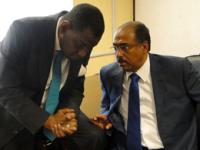
(from left) Nigeria’s Health Minister Professor Babatunde Osotimehin in discussion with UNAIDS Executive Director, Michel Sidibé. 22 February 2010, Nigeria.
Credit: UNAIDS
Commending the Acting President for his progressive policies on AIDS, Mr Michel Sidibé, UNAIDS Executive Director said, “ Nigeria must take the lead in setting the regional and African Union agenda in eliminating mother to child transmission of HIV by 2015. Without Nigeria’s leadership, this goal will not be met in the African continent.”
Echoing the similar sentiments Ambassador Eric Goosby called for new strategic thinking on how to get ahead. “Programmes to prevent mother to child transmission of HIV will need to be owned and sustained locally,” said Ambassador Goosby.
Mr Sidibé and Ambassador Goosby are on a joint visit to Nigeria during which they also met with Health Minister Professor Babatunde Osotimehin. The health minister commended UNAIDS for mobilizing the participation of non-governmental organizations, faith-based entities and the private sector to support the national AIDS response. “This has helped us gain momentum in rolling out access to services,” said Professor Babtunde. “We still have challenges. We are aware that resources are limited, but we must meet the expectations of the people we have mobilized.”

(from left) Kaduna State Deputy Governor, Patrick Yakowa; UNAIDS Executive Director, Michel Sidibé; and Kaduna State Governor, Arc. Muhammed Namadi Sambo. 22 February 2010, Nigeria.
Credit: UNAIDS
Before his meetings in Abuja, Mr Sidibe also visited the Kaduna state, where adult HIV prevalence is around 7%. While in Kaduna he called on the Governor of the state, Mr Namadi Mohammed Sambo. Kaduna is on the verge of eliminating polio, the Governor proudly announced at the meeting attended by senior state officials. “We must now show similar dedication in reaching the universal access goals in Kaduna,” said Governor Sambo. “However we need continued technical and financial support to scale up access to services.”
Nigeria has only 30% of the resources available to meet the needs of the national AIDS response. The global economic downturn has had a negative impact on the resources available at the national and state level. Only 15% of spending on AIDS in the country comes from the domestic sources. But this has not stopped them from pursuing a dynamic agenda. A new national strategic framework on HIV is being prepared, that will aim to catch up on its universal access targets. Making most of the money available is one of the top priorities for the National Agency for the control of AIDS (NACA). It has begun to take the lead in coordinating the divergent sources of support the country receives and channel them towards people most in need. “Management of all resources—external and internal is very crucial to make a difference,” said Acting President Goodluck Jonathan.
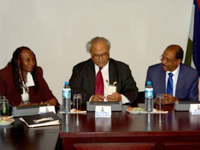
(from left) United States Ambassador to Nigeria Robin Renèe Sanders; Ambassador Eric Goosby, United States Global Coordinator on AIDS; and UNAIDS Executive Director Michel Sidibé.
Credit: UNAIDS
At the same time Nigeria has to start a policy dialogue to explore alternate approaches for promoting universal access that is sustainable. “One approach would be to democratise problem solving,” said Mr Sidibé. “This would give communities and people a chance to prioritise and hold themselves accountable.” The country is now applying the lessons learnt from the UNAIDS “three ones” principles to other health issues. It is forming a combined taskforce for AIDS, tuberculosis and malaria. The country now has a single national strategic framework for health that is costed and disaggregated for each of its states.
There is a growing demand for access to treatment and prevention services within Nigeria. This can be met by strengthening the current partnership between global, national and local partners. “The economic meltdown is not a reason for reducing investments that save babies and keep mothers alive,” said Mr Sidibe. “We cannot afford to let down the four million people living on treatment and the millions who are waiting for it.” Nigeria has a long way to go, but it is on the road already—providing access to HIV prevention, treatment, care and support.
Nigeria to accelerate universal access efforts in
Multimedia:
Feature stories:
Pampaida: millennium development in action in Nigeria (22 February 2010)

Feature Story
UNDP Head Helen Clark highlights importance of gender equality for Papua New Guinea to achieve MDGs
22 February 2010
22 February 2010 22 February 2010A version of this story first appeared at undp.org
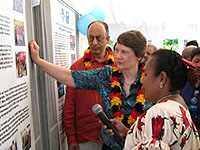
United Nations Development Programme Administrator Miss Helen Clark paid a three-day visit to Papua New Guinea to highlight significant opportunities which exist to promote investment in public service delivery, empower women, and advance the country's development agenda.
Credit: UNDP
United Nations Development Programme Administrator Miss Helen Clark highlighted HIV issues during her visit to Papua New Guinea (PNG). In her meetings with senior government and other officials, she underlined that “the United Nations development system stands ready to continue working with the Government and the people of Papua New Guinea in overcoming existing development challenges and accelerating progress towards the Millennium Development Goals, especially in areas such as education, health, advancing women’s empowerment and combating HIV/AIDS epidemic.”
At the UNDP Leadership Development Programme on HIV run by the Friends Foundation in the Gerehu suburb Miss Clark praised the programme for supporting people to back to their communities to find innovative ways to respond to the AIDS epidemic. Programmes include includes supporting orphans and reducing stigma and discrimination. She also met with one of three family sexual violence units at the Boroko police station in Port Mores which assists survivors of gender-based and domestic violence.
The sad truth is that where we see progress towards the MDGs lagging the most is often where the needs and status of women and girls are accorded low priority.
United Nations Development Programme Administrator Miss Helen Clark
Miss Clark launched the Second National MDG Progress Report together with the Minister for National Planning and District Development, Mr Paul Tiensten. As the report highlights, Papua New Guinea is currently off track to meet the Millennium Development Goals, including in areas of responding to HIV, reducing child and maternal mortality, and promoting gender equality.
“The sad truth is that where we see progress towards the MDGs lagging the most is often where the needs and status of women and girls are accorded low priority,” she said.
At the inauguration of the National Women’s Forum on Equality and Participation for Women: a Better Future for Papua New Guinea, which Miss Clark co-chaired with the Minister for Community Development, Dame Carol Kidu, the discussion focused on the need to increase women’s voices and participation in politics as a critical means to promote democracy, advance gender equality, and achieve sustainable and inclusive development.
Women in decision-making has been a critical issue in Papua New Guinea against a backdrop of a high level of gender-based violence coupled with high rates of HIV among women and girls between the ages of 15-29 years. Papua New Guinea currently has only one female Member of Parliament, and efforts are underway to reserve 22 seats for women in Parliament.
“Efforts to promote gender equality, including promoting girls’ education, improving maternal health, combating gender-based violence, and securing female representation in government leadership positions, are of critical importance to advance development in Papua New Guinea,” said Miss Clark. “Unleashing the potential of Papua New Guinea means giving women the same opportunities in life as men,” she said.
UNDP Head Helen Clark highlights importance of ge
Cosponsors:

Feature Story
Pampaida: millennium development in action in Nigeria
22 February 2010
22 February 2010 22 February 2010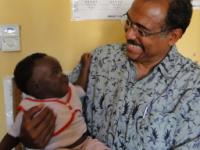
UNAIDS Executive Director Michel Sidibé meets Agnes, 21 February 2010.
Credit: UNAIDS
Agnes, barely six months old, was comfortable going into the lap of complete strangers, smiling and clutching fingers that were extended towards her. She has been making regular visits to the clinic with her mother Sarah and father Yusuf Samalia. These have been made possible by the Millennium Village Project that is providing comprehensive health, education and poverty alleviation programmes in the Pampaida village located in the Kaduna state of Nigeria. Of the 20,000 people who live in the area around 44% are in the reproductive age groups.
Five years ago, few pregnant women would go to a health centre to get an antenatal check up. Most would never return after their first visit. It was common that women gave birth at home, often attended by untrained help and no recourse to healthcare in case of an emergency.
Yusuf and Sarah have shown courage by taking the HIV test and to ensure that they give their child a full chance to be born without HIV. We can and must eliminate mother to child transmission by 2015.
Michel Sidibé, UNAIDS Executive Director
Sarah however belongs to a new generation that has seen her village transform as she became an adult. The village health worker motivated her and other women to come to the local health clinic for routine check ups. Here trained doctors and nurses provide quality health care. The results can be felt by the community. Between 2007 and 2009 there were about 240 institutional deliveries, a three fold increase in women who have benefited from maternal child health services that have come nearer to home. There were only four deaths due to pregnancy related complications, a sharp drop from times before the project began.
At one of her antenatal check ups, Sarah was diagnosed as living with HIV. She was offered treatment and counselling on how to prevent her child from getting infected. She coaxed her husband to take the HIV test at the clinic. He too was found to have HIV.
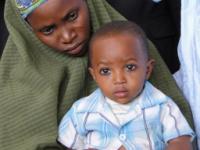
Mother and child attend the health clinic in Pampaida village, 21 February 2010.
Credit: UNAIDS
Yusuf has a second wife. “I am now romancing her to come and take the test,” he said. His eyes are hopeful that she may not have been infected.
Dr Ojo Euitayo and his team sent Sarah to the referral hospital some 30 kilometres away from her village, a burden they feel is too much¬—physically as well as financially for the people of the village. But the parents were determined to ensure that their baby was not born with HIV. “We have to stop all new infections. It is our moral duty.” Yusuf told the visiting UNAIDS Executive Director and Deputy Governor of the Kaduna State.
“Yusuf and Sarah have shown courage by taking the HIV test and to ensure that they give their child a full chance to be born without HIV,” said Michel Sidibé, UNAIDS Executive Director. “We can and must eliminate mother to child transmission by 2015.”
Agnes was born at the referral hospital in Kaduna and upon birth was administered antiretroviral prophylaxis. Her mother chose to breast feed her. “We counsel all mothers about infant feeding options, including substitution feeding. However most people cannot afford it,” says Dr Ojo. “Once the mother makes the decision, we take all efforts to support her.”
The millennium project in Pampaida in many ways demonstrates how the world can look like if we achieve the millennium development goals.
Janthomas Hiemstra, Deputy Country Director of Programmes for UNDP
The clinic serves as a good model for basic health care. They take the help of village health worker like Ibrahim who can treat malaria and diahorrea and help in referring patients with TB to the clinic. The village health workers are now professionals in their own right, even though they make have just barely passed school. With an intensive training they have been able to take on many tasks and freeing up the nurses and doctors to focus on major needs. The village clinic is now also experimenting with mobile phones, seeking advice from professionals as well as in monitoring the health progress of their village.
In a nearby youth centre, a different kind of transformation is taking place. Vuhu Lawal is learning how to use a computer and the internet along with his friend. Their equally young and energetic trainer Yusuf Ibrahim is proud to show off his centre. In between classes on how to use a word processor, he often talks to the young people about HIV and other issues. More children and young people are in school today, especially girls. The fields around the school and clinic have been tilled, thanks to loans as well as training available to the famers. Access to a thriving market has helped cut off the middle man, bringing more money into the household. Today, most people are living above the poverty line earning more than US$ 1 per day. All this has been possible with small but effective investment of US $110 per person.
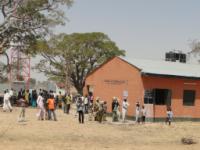
The local resource centre in Pampaida village, 21 February 2010.
Credit: UNAIDS
“The millennium project in Pampaida in many ways demonstrates how the world can look like if we achieve the millennium development goals,” said Janthomas Hiemstra, the Deputy Country Director of Programmes for UNDP which implements the project. The growing success of the programme has attracted other development investments in the area. The state government of Kaduna has built a road into the village and mobile telephony providers have installed a distribution tower.
The Deputy Governor of the Kaduna state Patrick Ibrahim Yakowa is happy with the success of the village and the national and international attention it is getting. “We must take the lessons learnt from Pampaida and apply it across Kaduna. We will work towards elimination of mother to child transmission and strive for zero new infections in Kaduna,” he promised.
Yusuf and Sarah are in many ways privileged to live in a millennium village. Elsewhere their fellow citizens have not been so lucky. Only 11% of HIV-positive pregnant women have access to mother to child transmission prevention services. Agnes has been given a chance to be born without HIV, but her parents and health care workers are waiting to find out about Agnes’s HIV status. The health centre currently does not have access to rapid infant diagnostic kits. Director General of National Agency for the Control of AIDS, Dr Joseph Idoko promises to make them available immediately. Till then Yusuf and Sarah will have to wait and hope for the best.
Pampaida: millennium development in action in Nig
Feature stories:
UNAIDS, Millennium Villages join forces to keep children free from HIV in Africa (21 September 2009)
External links:
Related

Feature Story
Protecting drug users from becoming infected with HIV in Lithuania
19 February 2010
19 February 2010 19 February 2010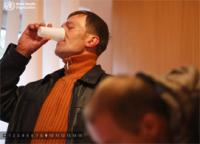
A WHO study, published in 2008, shows that opioid substitution therapy in low- and middle- income countries (as elsewhere) significantly reduces risky behaviour, improves the health of patients and helps them to re-integrate into society. Credit: WHO/Piotr Malecki
The pioneering Vilnius Centre for Addictive Disorders in Lithuania is the focus of the second Dispatch from the Field, a web series designed to highlight the World Health Organization’s work at country level.
The centre is considered a model of best practice in treating drug dependence. Heroin users are offered daily methadone and have access to a mobile needle-syringe exchange service called the ‘Blue bus.' Five days a week, social workers who run the bus go to places frequented by drug users and dispense both sterile equipment and advice about health and social services. Drug users are often marginalized and do not tend to seek health care.
Cooperating closely with the World Health Organization, the centre uses WHO guidelines and advocacy to strengthen its work.
Harm reduction interventions in Lithuania started early in the course of the HIV epidemic and are credited with helping to keep the country’s HIV prevalence relatively low. In 2008, Lithuania’s prevalence was less than one tenth that of some neighbouring countries, and the proportion of new cases of HIV caused by injecting drug use has been steadily decreasing.
Working with injecting drug users in Eastern Europe and central Asia is of paramount importance. Injecting drug use is the main mode of HIV transmission in the region, accounting for some 75-80 percent of all cases. A 2008 WHO study shows that opioid substitution therapy in low- and middle-income countries significantly reduces high risk behaviour, improves health and helps drug users re-integrate into society.
Three regional WHO-supported Harm Reduction Knowledge Hubs have been established, in which the Vilnius centre plays a pivotal role. The Hubs bring together the collective knowledge of regional and international experts and provide technical assistance, training and a forum for the exchange of ideas to widen and deepen the AIDS response.
This latest Dispatch from the Field features a photo essay on the Vilnius Centre for Addictive Disorders, an interview with its Director, Dr Emilis Subata and an article on the WHO Knowledge Hubs.
Protecting drug users from becoming infected with
Cosponsors:
World Health Organization
World Health Organization - HIV
Multimedia:
Photo essay on the Vilnius Centre for Addictive Disorders
Interview with Dr Emilis Subata, Director of the Vilnius Centre for Addictive Disorders
Article on the WHO Knowledge Hubs
Feature stories:
Advocating for HIV and Hepatitis C co-infection services for injecting drug users in India (15 September 2009)
Injecting drug users take central role in anti-stigma film (10 August 2009)
International Harm Reduction conference opens in Bangkok (20 April 2009)
OPINION: HIV and drugs: two epidemics - one combined strategy (20 April 2009)
UNODC and Iran sign agreements to reduce vulnerability of women and Afghan refugees to drugs and HIV (24 March 2009)
Injecting drug use and HIV: Interview with UNAIDS Team Leader, Prevention, Care and Support team (11 march 2009)
OPINION: Silence on harm reduction not an option (11 March 2009)
Related

Feature Story
Countries urged to review progress made in achieving national AIDS targets
18 February 2010
18 February 2010 18 February 2010Ahead of the UN High-level Meeting on Millennium Development Goals, UNAIDS calls on all countries to review progress and barriers for achieving national targets for universal access.

UNAIDS Executive Director Michel Sidibé (left) with Botswana's Vice President, Lt. Gen. Mompati Merafhe.
Gaborone/Geneva, 18 February 2010 – UNAIDS is calling for an international effort to renew commitment for countries to achieve universal access to HIV prevention, treatment, care and support. Countries are urged to undertake an open and inclusive consultation process—bringing together governments, development partners, civil society organizations, networks of people living with HIV and community groups to review the progress made in reaching country targets for universal access. UNAIDS will support countries and regional bodies in convening these reviews.
The call to action was made by UNAIDS Executive Director Mr Michel Sidibé while on an official visit to Botswana.
Universal access to HIV prevention, treatment, care and support is about achieving equity. This is a groundbreaking global movement that is saving millions of lives.
UNAIDS Executive Director, Michel Sidibé
“Universal access to HIV prevention, treatment, care and support is about achieving equity. This is a groundbreaking global movement that is saving millions of lives,” said Mr Sidibé. “However progress has been uneven so now we need to take stock of what’s working and what is not and to link future national progress in AIDS to the Millennium Development Goals.”
UNAIDS has lauded Botswana in its progress towards achieving its universal access targets. Despite having one of the highest HIV prevalence rates in the world, the country has been able to provide antiretroviral treatment to more than 80% of people in need. It has also made significant strides in preventing mother to child transmission of HIV, achieving over 93% coverage in 2009. Botswana was one of the first countries in Africa to adopt universal access targets.
“Our success has been possible due to strong commitment on part of the government, development partners and civil society to collectively set ambitious targets and overcome bottlenecks,” said Lesego Motsumi, Botswana’s Minister for Presidential Affairs and Public Administration. “In this regard we welcome the UNAIDS call to review our progress made in achieving universal access to guide us in meeting the Millennium Development Goals.”
The universal access movement was launched in 2006 when UN member states signed a political declaration to achieve universal access to HIV prevention, treatment, care and support. Its aim is to ensure that people everywhere have access to HIV prevention, treatment, care and support by 2010. Countries affirmed their commitments by setting ambitious national targets. However progress towards these targets has varied—with some countries exceeding some of their targets but not reaching others.
"It is now time for people living with HIV, community groups and our governments to sit down together and talk honestly about where we are and where we need to go to change the course of the epidemic," said David Ngele, a representative of the Botswana Network of People living with HIV.
The country and regional level reviews, which will take place in all regions of the world, will utilize the data collected for the 2010 country progress reports as the basis to identify barriers and strategies to meet their targets in 2010 and beyond. UNAIDS will convene an international advisory team to analyze the review reports and make recommendations on how to redouble progress towards universal access.
UNAIDS is committed to ensure that regional bodies for political, social and economic cooperation are engaged in supporting this process, which will take place over the course of 2010. “In Africa, this process will enable countries across the continent to measure their progress against the commitments made at the African Union in Brazzaville in 1996 to reach universal access by 2010,” said Mr Sidibé.
The 2010 reviews will provide a forum to hold partners accountable as well as celebrate achievements. In addition, implementers and policy makers can jointly chart out new strategies to remove programme implementation barriers. These consultations will provide an opportunity to analyze existing approaches to HIV prevention, identifying gaps and priorities. The process should catalyze a prevention revolution that aims for zero new HIV infections including the elimination of mother-to-child HIV transmission. It will also help countries re-adjust their plans on access to HIV treatment based on the new treatment guidelines and begin thinking about treatment 2.0 ─ a new generation of treatment options that are sustainable.
The ongoing economic crisis and the ensuing cuts in national budgets and international aid investments have exposed the vulnerabilities of national AIDS programmes. The reviews will include an assessment of current AIDS spending patterns and propose new investment options that are aligned to local epidemic trends, and increase efficiencies.
Outcomes of the review are expected to result in the revision of national strategic frameworks, rejuvenating national AIDS responses. These reviews will provide countries with an impetus to accelerate progress towards achieving national universal access targets as a means to realizing the Millennium Development Goals.
Countries urged to review progress made in achiev
Press centre:
Download printable version (pdf, 70 Kb)
Multimedia:
Contact:
Dominique De Santis
tel. +41 22 791 4767
desantisd@unaids.org
Related links
Contact Dominique De Santis tel. +41 22 791 4767 desantisd@unaids.org
Related

Feature Story
King of Swaziland calls for reinforced national response to AIDS
17 February 2010
17 February 2010 17 February 2010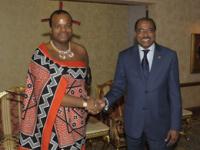
During his visit to Swaziland UNAIDS Executive Director Michel Sidibé met with His Majesty, King Mswati III. 15 February 2010.
Credit: UNAIDS/ Williams
UNAIDS Executive Director Michel Sidibé was in Swaziland on the first leg of a three-country tour of Southern Africa to gain insight on progress and challenges towards achieving the goals of universal access to HIV prevention, treatment, care and support. Mr Sidibé will be exploring options for joint action to intensify efforts to reduce new HIV infections.
Mr Sidibé met with His Majesty, King Mswati III, and commended him for his continued support to the AIDS response.
His Majesty, King Mswati III expressed his thanks to Mr Sidibé for highlighting the importance of AIDS in the country through his visit.
"I am deeply concerned about the tragic impact of AIDS on the people of Swaziland, especially on young people, families and children. We must ensure that children living with HIV, many of whom who have lost parents to AIDS, can live a full and healthy life," said His Majesty, King Mswati III.
We are committed to help change behaviour to stop new infections among our people.
His Majesty, King Mswati III
Swaziland has the highest rate of HIV prevalence in the world, estimated at 26% of the adult population in 2007.
Prevalence varies according to age and peaks for women in the group 25-29 where one in two women are living with HIV, whereas the age group with the highest HIV prevalence among males are those in the 35-39 bracket, with 45% living with HIV.

Michel Sidibé, UNAIDS Executive Director welcomed by the Honorable Minister of Health Dr Bennedict Xaba upon arrival to Swaziland, 14 February 2010.
Credit: UNAIDS/ Williams
Estimations show that three in every 100 people will be infected with HIV every year unless prevention efforts are stepped up. With this in mind, Mr Sidibé urged Swaziland to heed his call to ignite a prevention revolution with the aim of achieving zero new infections.
His Majesty, King Mswati III replied "We are committed to help change behaviour to stop new infections among our people. We all speak one language and have one culture, so we will work to ensure a stronger national response to this critical national programme."
“There is also tangible evidence of progress in the HIV response in Swaziland,” Mr Sidibé added. “This is particularly evident in the increase of numbers of people, notably pregnant women, who have access to treatment. Almost three out of four pregnant HIV positive women receive antiretroviral drugs to prevent transmitting the virus to their children. This is a significant achievement in Swaziland’s response to HIV,” he added.
There is tangible evidence of progress in the HIV response in Swaziland. This is evident in the increase of pregnant women who now have access to antiretroviral treatment.
Michel Sidibé, UNAIDS Executive Director
The two-day visit in Swaziland included a meeting with the country’s Prime Minister Dr Barnabas Sibusiso Dlamini. During the meeting, Mr Sibidé urged the Government of Swaziland to protect budget allocations to AIDS programmes.
Swaziland receives support from external donors towards the funding of its antiretroviral programmes. However dwindling support following the global economic downturn has also caused the Swazi government to cut back on all areas of social spending, including health.

UNAIDS Executive Director, Mr Michel Sidibé, meets with The Right Honorable Prime Minister, Dr Barnabas Sibusiso Dlamini, Swaziland, Mbabane, 15 February 2010. Credit: UNAIDS/ Williams
On his last day of his visit, Mr Sidibé met with civil society organisations, including representatives of groups of people living with HIV, women and youth organisations. He urged them to continue working closely with the government to help mobilize resources and achieve further successes in the response to HIV.
King of Swaziland calls for reinforced national r
Multimedia:
Feature stories:
Friends of UN Plus in Swaziland, Mozambique (21 Sept 2009)
Swaziland: WFP supports families living with HIV (08 June 2009)
Ambitious project brings key countries in eastern and southern Africa closer to ‘knowing their epidemics’ (25 May 2009)
UNAIDS partners in new Clinton Global Initiative to address sexual violence against girls (25 Sept 2009)
Publications:
Swaziland HIV Prevention Response and Modes of Transmission Analysis




